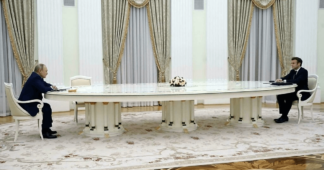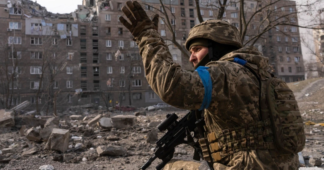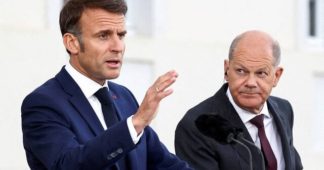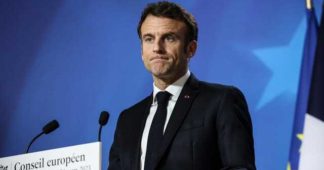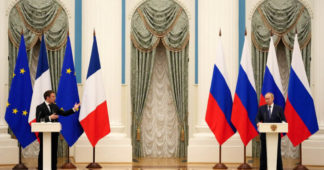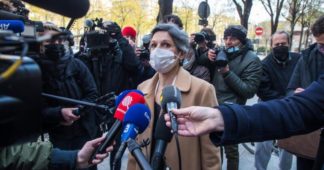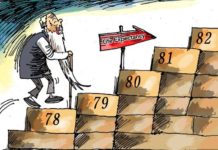Europeans went to the polls over four days to elect a new European Parliament. Many of those elected are critical of the European Union’s approach to the war between Ukraine and Russia.
By Cain Burdeau
June 11, 2024
At a summit in Berlin on Tuesday, European Union leaders welcomed Ukrainian President Volodymyr Zelenskyy and deepened their pledges to arm and rebuild his war-torn country and bring Kyiv into the EU club of nations, whatever the cost.
But outside the halls of power in Europe, signs of growing unease with — and even rebellion against — the EU’s unwavering support for Ukraine and determination to defeat Russia were expressed in the recent European Parliament elections as voters in Austria, Germany, France and elsewhere backed parties skeptical of hardening the conflict with Moscow.
Such misgivings, though, will remain on the margins in the coming weeks as Western leaders meet at high-profile events — a Group of Seven summit in Italy, a Zelenskyy peace conference in Switzerland, a NATO gathering in Washington — and tout the war as a fight between democracy and dictatorship.
That was the mood in Berlin on Tuesday.
European Commission President Ursula von der Leyen, fresh off victorious European elections for her conservatives, announced a broadening of talks over Ukraine’s potential entry into the EU. She said Kyiv will receive 1.5 billion euros ($1.6 billion) in frozen Russian assets held in European banks to help it rebuild.
“Putin must fail. Ukraine must prevail. And we must help Ukraine to rise from the ashes and be master of its own future,” von der Leyen said at the Ukraine Recovery Conference. “We have always said that Russia must be held accountable for its crimes. And now, we are making Russia pay.”
But many Europeans aren’t so sure about the high costs the EU too is paying with its determination to see Russia fail.
In Austria, the far-right Freedom Party won the most votes in the European elections on a “Stop the EU Madness” platform calling for an end to “warmongering.” With national parliamentary elections later this year, a win by the Freedom Party could see Austria join Hungary and Slovakia in calling for negotiations with Russian President Vladimir Putin to end the war.
In France, Marine Le Pen, the far-right leader with pro-Russia sympathies, trounced French President Emmanuel Macron. After the drubbing, Macron shocked Europe by announcing snap parliamentary elections, a gamble that could further strengthen Le Pen’s National Rally and erode support for Ukraine.
In the run-up to the election, Macron made himself into Europe’s leading war hawk with statements about sending French troops to Ukraine, allowing Kyiv to strike targets inside Russia and defining the war as existential for the EU.
A clash on their opposing views on the war may become central in this titanic election battle between Le Pen and Macron over the next month.
In Germany, those opposed to arming Ukraine — the far-right Alternative for Germany and a new radical-left party led by Sahra Wagenknecht — were the only political forces to see their ranks swell. Backing for the AfD jumped by 4.9% to climb to 15.9% and Wagenknecht’s anti-war party won 6.2% of the vote in its first elections.
“Its instant success highlights continued electoral demand for a careful course on Ukraine,” the political risk firm Teneo said in a briefing note about Wagenknecht’s success.
The biggest loser in Germany were the Greens, arguably the country’s most hawkish party since the outbreak of a full-scale war between Russia and Ukraine. With 11.9% of the vote, their support was cut nearly in half from the 2019 European elections.
All of this is spooking those in Europe who see the rise of the far right as both a danger to the EU and Ukraine.
“The European Parliament elections have just demonstrated how the war — or better the perceived need to end it, accompanied by disinformation directly or indirectly sponsored by the Kremlin, affected many election campaigns and results across Europe,” said Gwendolyn Sasse, the director of the Center for East European and International Studies in Berlin.
“Wake up! After these elections, Europe is again in danger,” ran a headline in The Guardian newspaper over an opinion piece by Timothy Garton Ash, a prominent historian and commentator who is an ardent Ukraine supporter.
For some commentators, though, the election results accurately reflected worries felt by Europeans over the war’s economic consequences and the possibility of the conflict expanding.
“I think Le Pen will see a benefit in making this [election] a kind of referendum on Macron and his apparent march to war with Russia,” said Gabriel Elefteriu, an international security expert with the Council on Geostrategy think tank in London, speaking on a panel for Brussels Signal, a right-wing news outlet.
Elefteriu called the rise of a strong far right “a real political revolt in Europe and it’s here to stay.”
“The question is how will the establishment deal with this situation,” he said. “They’ve got two options: One is to try to launch some kind of war in defense of democracy and use the power of state as much as they can to try to limit the further growth of the hard right in Europe.”
Ahead of the elections, surveys showed that voters put security and soaring inflation among their top-most concerns — and both are related to the war in Ukraine.
Since the war broke out in February 2022, Europeans have been pummeled by soaring energy costs and economic stagnation caused largely by the cutoff of cheap Russian energy supplies. At the same time, Russia’s economy has weathered Western sanctions and even begun to thrive, leaving many in Europe to question whether the strategy against Russia has backfired.
Meanwhile, Europe has watched with increasing anxiety as its sense of security has crumbled over the past 27 months of war. Now, European leaders talk with urgency about the need to prepare for armed conflict with Russia, ramp up military spending, reintroduce conscription and prevent Putin from winning in Ukraine.
“Security and purchasing power are directly related to the Ukraine situation because security is not only about being safe in your cities, it is also about knowing that we are not going to wake up one fine morning and be faced with a third world war,” said Konstantinos Bogdanos, a far-right Greek politician, speaking to the Brussels Signal. “There are many Europeans who have been struggling with the idea that the EU is ready at any time to assist Ukraine at all costs.”
In Moscow, meanwhile, Russian leaders and pundits viewed the results with glee.
Vyacheslav Volodin, the head of Russia’s State Duma, on social media described Macron and German Chancellor Olaf Scholz as “clinging to power” in the face of an angry electorate.
“The economy is stagnating, there is a migration crisis and the countries are embroiled in a war in Ukraine against their own national interests,” Volodin said.
Sergei Markov, a political analyst and former Kremlin adviser, called the election a rejection of the West’s approach to the war.
“I hope Macron understands that the French are rejecting him for fanning the war against Russia in Ukraine,” Markov, a former Kremlin adviser, said. “But maybe he will, instead, choose escalation and launch a NATO war with Russia.”
We remind our readers that publication of articles on our site does not mean that we agree with what is written. Our policy is to publish anything which we consider of interest, so as to assist our readers in forming their opinions. Sometimes we even publish articles with which we totally disagree, since we believe it is important for our readers to be informed on as wide a spectrum of views as possible.
